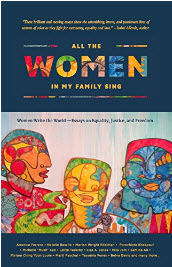Unless you are friends with someone who’s told you in detail about the indignities of discrimination – and you really let it sink in – or you know someone and are deeply offended when this person regularly utters racial slurs, or you yourself are a person of color, you may not know the extent of the damage the world’s racist societies can do to the human spirit.
It’s worse than you think. Listen to this powerful and emotional TED Talk from Anjelica Dass, a now-famous artist of color whose work is a passionate appeal for people the world over to stop dividing ourselves into black, white, red, yellow and brown, but rather acknowledge we come in all colors. Think strawberry yogurt, coffee-with-cream, walnut, dark wood that’s gotten wet…

And now comes a powerful book, compiled and edited by Deborah Santana, that gives voice to twenty women-of-color essayists: All the Women in My Family Sing: Women Write the World – Essays on Equality, Justice, and Freedom. Each writer in this book describes with deep feeling some small measure of what she has experienced because of racism and of how she is coming or has come to terms with the inequality, the injustice and the lack of freedom that being of-color can mean.
The offspring of my Jewish-Christian, Russian-Irish mixed marriage were raised in Shaker Heights. I chose to live there because it was considered by many at that time to be the most successfully integrated community in the world. Living there helped attune us to many of the nuances of discrimination. And because someone very close to us is the offspring of a mixed-race relationship, all of us are always seeking to better understand how to combat prejudice and racism in this society. No matter whether you know, or want to know more, about the experiences of persons of color, Santana’s book is a powerful aid to understanding.
I read all these stories through, my heart squeezing and my chest heaving as I felt the suffering and confusion so many of the writers experienced growing up race-stigmatized. And of course, their suffering doesn’t stop in the adult world.
Although good readers of any age can easily understand the language, the content in some – detailing memories of profoundly abusive experiences – might be too discouraging for younger readers. All the stories are worth reading. Below is a selected list to consider:
- Home Going. Novelist Natalie Baszille writes of her experiences of “home” as the daughter of a black man born and raised in Southern Louisiana who moved far away to escape the pain and indignities of the persecution commonly handed out to black people in that part of the country.
- Indian Territory. Growing up Indian in a white world, author Eliana Ramage tells of rude questioning, experiencing the feel of history rewritten when her school visits the home of Andrew Jackson, who so ruthlessly persecuted her ancestors and is honored as a great hero.
- From Negro to Black. A woman who lived through the Civil Rights movement, La Rhonda Crosby-Johnson writes of finding herself and family shifting identities first as Colored, then briefly Negro, then Black, then African American, and of her struggle to learn how to shed such labels and become herself.
- A Letter to My Granddaughter. A highly successful journalist, the first Black woman to be recognized for her achievements in the field, writes a letter to her granddaughter explaining that the only way to overcome prejudice and racism is to speak your truth fearlessly.
- Asian American Punk. Want Chyi, then a tiny girl of Taiwanese-Chinese heritage, often stared-at in her mostly white high school in the U.S., writes of how falling in love with punk music freed her to feel like she belonged somewhere at last.
- The Girl from the Ghetto. Deborah L. Plummer writes in vivid detail about her life as a kid in a Black neighborhood in Cleveland, Ohio. At age 11 she was done with the kids’ book section of the library and moved on to subjects that matched the seriousness of her life experiences.
- African in America. High schooler Ugochi Egonu writes in poetic stanzas of her frustration and anger at the ignorance and presumption about Africa that many white people display. While she is growing up in California, her grandmother lives in Nigeria and speaks only Igbo. Egonu mourns that she herself cannot speak more than a few words. But she vows that she will grow to womanhood and be the one to tell her story.
In case you have a granddaughter or grandson that you want to help understand the damage that racism does, this book is a treasure full of important truths.
*To see the names of all women who contributed, click on the “19 more” link under the title on the Amazon page for the book.
